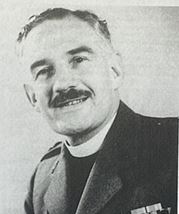Neville was born in 1914, educated at St John’s School, Leatherhead and Oxford, ordained in 1938 and joined The Royal Army Chaplains’ Department in October 1939.

He went to France with the Green Howards in April 1940 and was evacuated through Dunkirk a month later: in December of the same year, he was Mentioned in Despatches.
In January 1941 he sailed for Egypt and joined the 7th Queen’s Own Hussars in April: he remained with the Regiment until the end of the War and, says the Regimental History, “gained the admiration and affection of all ranks”.
He saw active service in the Western Desert, Burma and Italy; It was in Burma that he won his DSO, the citation for which was as follows:
“Captain Metcalfe is attached to 7th Hussars as Regimental Chaplain. On 6th March 1942, this officer carried out a burial service close to the firing line North of Pegu. He then returned first aid throughout the day when fighting was taking place in and around the town. He sent his car back to safety, himself to Pegu and helped to look after the wounded and administered remaining with the wounded. Throughout the night of 6th/7th March, Captain Metcalfe continued to look after the wounded and performed burial services on the dead.
On the morning of 7th March, after the 7th Hussars had withdrawn, Captain Metcalfe remained behind to assist in loading wounded into lorries and sending them away across the bridge at Pegu. Captain Metcalfe remained with the last ambulance and succeeded in getting it away under heavy fire. South of the bridge the ambulance again came under fire and was held up. Captain Metcalfe then collected some food from a knocked-out tank and went around distributing this food amongst the wounded.
“When the ambulances were able to continue, Captain Metcalfe drove one himself to safety and then handed it over to a driver. Captain Metcalfe was slightly wounded by mortar fire.
“After the ambulance had got clear, Captain Metcalfe walked back with the last Infantry to withdraw along the railway and subsequently arrived at Hlegu, a distance of 25 miles.
“The conduct of this Chaplain has been magnificent throughout the operation. His courage, unfailing cheerfulness, and his complete disregard for his safety have been an inspiration and encouragement to all ranks.”
This citation for an immediate award was signed by his Commanding Officer, Lieutenant Colonel Fosdick; the Brigade which the Regiment supported; the Divisional Commander 7th Armoured Brigade; the Commander 48 Infantry Commander and the GOC Burma, General Alexander.
Fruity, as he was known in the Seventh, was Mentioned in Despatches a second time in October 1942, but he was not just a brave man. He was a superb Regimental Padre who knew everyone, as they knew him. He was a keen player of any game. especially Rugby – but he gave much of his time when we were out of the line in the Middle East to help keep the men interested. The Regimental History pays him this tribute:
“Not only was he the moving spirit in seaside camps, but he promoted many excursions and it is said – instigated more than one military exercise in the neighbourhood of some place of historic interest
“As a guide, Metcalfe was excellent, always ready and able to explain and answer questions. Many 7th Hussars owe to him their visits to the great monuments of the Near East-the temple and tombs of Upper Egypt, the Monastery of St Catherine on Mount Sinai, the rose red, rock-hewn city of Petra, the massive Roman temple at Baalbek and what is perhaps, to a soldier, the most impressive of all the Krak des Chevaliers, the fortress of the Crusaders, long since deserted, but still vast and dominating in its solitude,
This gentle hero went home on Python soon after the War ended, he had been married in 1940 and no one argued with his decision though we mourned his departure. He soldiered on in the RACHD until 1972, his last appointment being that of Assistant Chaplain General Northern Command. He was made
& Queen’s Honorary Chaplain in 1969.
Neville Metcalfe retired in York, sadly he suffered from Alzheimer’s Disease towards the end and died duly this year at the age of 80.
None of us who served with him have ever forgotten him, and never will, he may not have been a silver-tongued preacher, but his profound faith and his utter sincerity carried us with him, and we owe him more than words can tell, “We will remember him!


